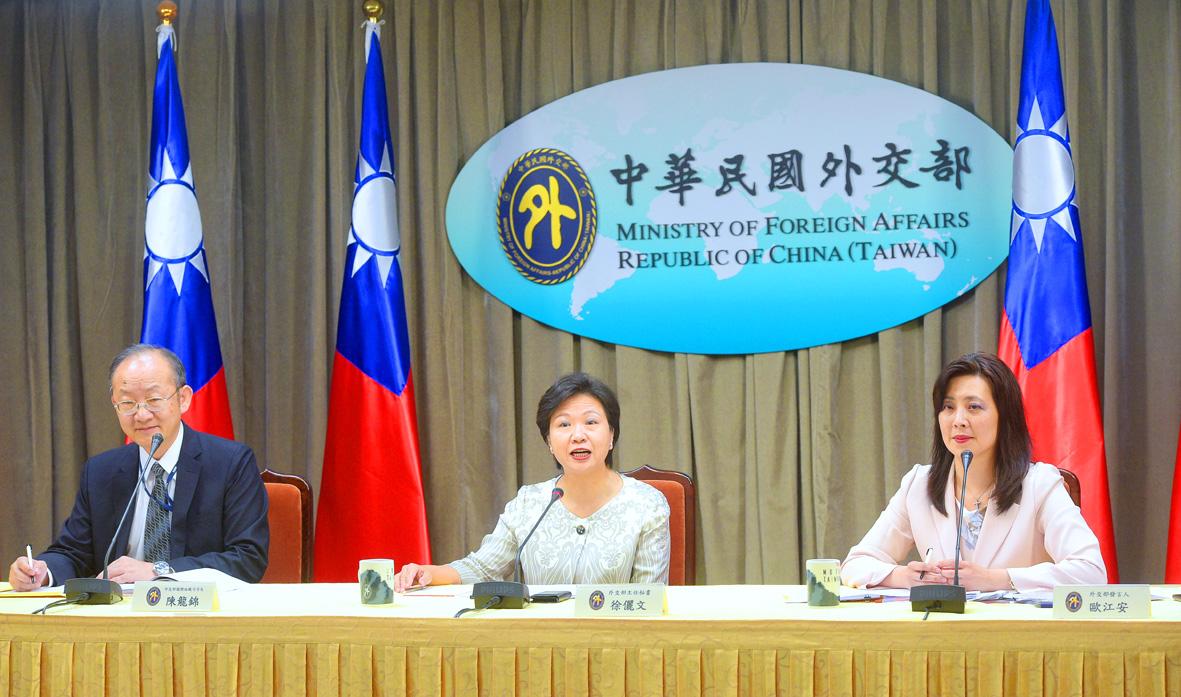The nation’s campaign to rejoin the UN this year would highlight its achievements in containing COVID-19 and its commitment to multilateralism, the Ministry of Foreign Affairs (MOFA) said yesterday.
The 75th session of the UN General Assembly is slated to open on Sept. 15 at the UN headquarters in New York City, with its general debate set to start on Sept. 22 under the theme “The Future We Want, the UN We Need: Reaffirming Our Collective Commitment to Multilateralism.”
The ministry’s campaign would highlight Taiwan’s willingness and ability to join the UN bid to curb the COVID-19 pandemic and revive the global economy through multilateral efforts, MOFA Secretary-General Lily Hsu (徐儷文) told a news conference in Taipei.

Photo: Chang Chia-ming, Taipei Times
It would also reiterate the nation’s three appeals: The UN should take immediate action to address the improper exclusion of 23.5 million Taiwanese from UN institutions, rectify its improper practices of depriving Taiwanese and the Taiwanese media of their rights to visit or attend events at UN premises; and ensure Taiwan can participate in mechanisms and events related to the UN Sustainable Development Goals through equal and dignified means, Hsu said.
As usual, the ministry would ask the nation’s diplomatic allies to speak up for Taiwan during the debate and write to UN Secretary-General Antonio Guterres, she said.
The ministry would also hold General Assembly-related events at the Taipei Economic and Cultural Office (TECO) in New York City, said Hsu, who was director-general of the TECO in New York before assumed her current post, adding that most of the events would be held virtually due to COVID-19-related crowd size restrictions.
On Sept. 23 last year, Hsu was invited by the US to attend a speech by US President Donald Trump at the UN headquarters, which was regarded as a diplomatic breakthrough in Taiwan.

Alain Robert, known as the "French Spider-Man," praised Alex Honnold as exceptionally well-prepared after the US climber completed a free solo ascent of Taipei 101 yesterday. Robert said Honnold's ascent of the 508m-tall skyscraper in just more than one-and-a-half hours without using safety ropes or equipment was a remarkable achievement. "This is my life," he said in an interview conducted in French, adding that he liked the feeling of being "on the edge of danger." The 63-year-old Frenchman climbed Taipei 101 using ropes in December 2004, taking about four hours to reach the top. On a one-to-10 scale of difficulty, Robert said Taipei 101

Nipah virus infection is to be officially listed as a category 5 notifiable infectious disease in Taiwan in March, while clinical treatment guidelines are being formulated, the Centers for Disease Control (CDC) said yesterday. With Nipah infections being reported in other countries and considering its relatively high fatality rate, the centers on Jan. 16 announced that it would be listed as a notifiable infectious disease to bolster the nation’s systematic early warning system and increase public awareness, the CDC said. Bangladesh reported four fatal cases last year in separate districts, with three linked to raw date palm sap consumption, CDC Epidemic Intelligence

Two Taiwanese prosecutors were questioned by Chinese security personnel at their hotel during a trip to China’s Henan Province this month, the Mainland Affairs Council (MAC) said yesterday. The officers had personal information on the prosecutors, including “when they were assigned to their posts, their work locations and job titles,” MAC Deputy Minister and spokesman Liang Wen-chieh (梁文傑) said. On top of asking about their agencies and positions, the officers also questioned the prosecutors about the Cross-Strait Joint Crime-Fighting and Judicial Mutual Assistance Agreement, a pact that serves as the framework for Taiwan-China cooperation on combating crime and providing judicial assistance, Liang

US climber Alex Honnold left Taiwan this morning a day after completing a free-solo ascent of Taipei 101, a feat that drew cheers from onlookers and gained widespread international attention. Honnold yesterday scaled the 101-story skyscraper without a rope or safety harness. The climb — the highest urban free-solo ascent ever attempted — took just more than 90 minutes and was streamed live on Netflix. It was covered by major international news outlets including CNN, the New York Times, the Guardian and the Wall Street Journal. As Honnold prepared to leave Taiwan today, he attracted a crowd when he and his wife, Sanni,